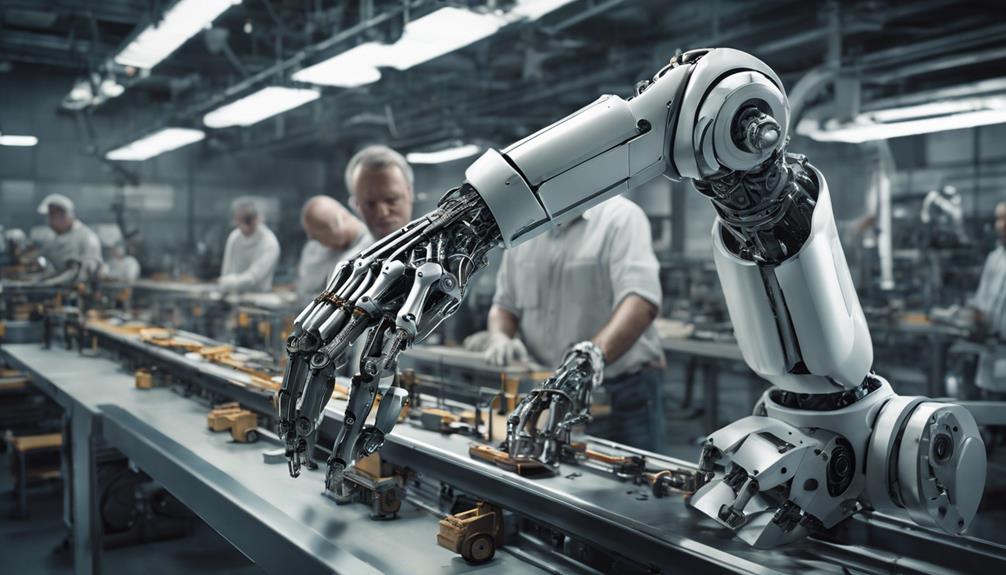As artificial intelligence continues to advance, its impact on the job market is becoming increasingly clear. The rapid advancement in AI technologies is reshaping industries and changing traditional job roles.
From automation of routine tasks to the displacement of manual labor, AI is revolutionizing the way we work. The implications of these changes are far-reaching, affecting various sectors and professions.
Stay tuned as we explore the ten ways AI is transforming jobs and shaping the future of work.
Key Takeaways
- AI automation displaces manual labor, shifting focus to skilled roles.
- Training in AI-related skills is vital for workforce adaptation.
- AI revolutionizes customer support, legal services, manufacturing, and transportation.
- Creative industries and data analysis roles intersect with AI for innovative outcomes.
Automation of Routine Tasks
The integration of artificial intelligence (AI) in various industries has led to the automation of routine tasks, revolutionizing operational efficiency and job dynamics. AI is increasingly being utilized to replace mundane activities such as data entry, analysis, and predictive maintenance. By streamlining these repetitive tasks, AI-driven automation enhances efficiency and accuracy within operations. Moreover, tasks like scheduling, quality control, and basic customer service are now being automated through AI technologies.
This shift towards automating routine tasks with AI not only boosts productivity but also frees up human workers from monotonous responsibilities. Employees are thus able to redirect their focus towards more strategic and high-value tasks, contributing to overall organizational growth. As a result, the automation of routine tasks is transforming work processes, elevating productivity levels, and reshaping job roles in the contemporary workplace. This evolution underscores the profound impact AI is having on job functions and the broader work landscape.
Displacement of Manual Labor

As artificial intelligence (AI) increasingly automates routine tasks, manual labor in industries such as manufacturing, agriculture, and transportation is being displaced by robots and AI-powered machines. This displacement of manual labor by AI is a significant aspect of the AI-driven future, reshaping the workforce dynamics.
Robots and AI-powered machines are now taking over repetitive and physically demanding tasks that were traditionally performed by manual laborers. As a result, the roles within these industries are shifting towards more skilled and technical positions. The efficiency and accuracy with which AI can perform these tasks are reducing the necessity for human workers in labor-intensive jobs.
Consequently, the displacement of manual labor by AI is creating a demand for workers with advanced technical skills to operate, maintain, and further develop these technologies. This transition underscores the evolving nature of work in the face of automation and highlights the importance of upskilling to adapt to the changing job landscape.
Enhanced Efficiency in Operations
The integration of AI into operational processes has revolutionized workflow efficiency through automation and task management.
Streamlining these processes not only saves time but also ensures accuracy and precision in data analysis and decision-making.
Streamlined Workflow Processes
Leveraging AI technologies revolutionizes workflow processes by automating repetitive tasks and enhancing operational efficiency through predictive algorithms.
AI streamlines workflow processes by automating routine tasks such as data entry and analysis, optimizing resource allocation, and scheduling using predictive algorithms. Automation through AI tools not only improves operational efficiency but also enhances quality control measures across various industries.
AI applications further aid in real-time decision-making and communication automation, contributing to streamlined operations. Businesses benefit from AI-powered process automation solutions as they enhance productivity, reduce errors, and improve scalability.
Automated Task Management
Implementing automated task management systems utilizing AI technology significantly enhances operational efficiency and streamlines workflows within various industries. AI automates task management, leading to increased productivity by handling routine tasks such as data entry and analysis. By automating these repetitive processes, organizations can reduce manual workload and allocate resources more effectively.
Moreover, AI-driven predictive algorithms play a crucial role in optimizing resource utilization and enhancing decision-making processes in operations. The use of AI tools enables enhanced scheduling and real-time decision support, facilitating efficient task management. This transformation in task automation allows human workers to focus on more strategic and creative tasks, ultimately improving overall operational efficiency and productivity.
Transformation of Customer Support

Revolutionizing traditional customer support practices, AI-powered chatbots have significantly reshaped how businesses interact with their customers. By handling over 85% of customer inquiries, these chatbots have transformed the customer support landscape. Automation in customer support not only reduces response times by 30% but also increases customer satisfaction rates. AI systems analyze customer data to provide personalized support, thereby enhancing the overall customer experience.
Virtual assistants play a crucial role in handling routine customer queries, freeing up human agents to focus on more complex issues, leading to a more efficient workflow. Moreover, AI-driven customer support solutions optimize resources, improve efficiency, and reduce operational costs for businesses. The integration of AI in customer support is not just about automating tasks but also about improving the quality of interactions and tailoring services to meet individual customer needs. This transformation signifies a shift towards a more streamlined and effective customer service approach.
Impact on Data Analysis Roles

With the rise of AI technologies revolutionizing customer support practices, a notable shift is occurring in the realm of data analysis roles as AI automation reshapes traditional approaches.
Impact on Data Analysis Roles:
- Automating Tasks: AI is automating data analysis tasks, leading to a transformation in traditional data analysis roles.
- Utilizing AI Tools: Data analysts are increasingly utilizing AI tools for faster and more accurate data processing.
- Efficient Analysis: AI algorithms can rapidly analyze large datasets, improving the speed and efficiency of data analysis tasks.
- Enhanced Decision-making: AI-powered data analysis tools are enhancing decision-making processes in organizations.
The integration of AI in data analysis roles is not only streamlining processes but also creating new opportunities for professionals with AI expertise. As AI algorithms continue to advance, data analysts need to adapt their skills to work alongside AI tools effectively. Understanding the capabilities and limitations of AI in data analysis is becoming crucial for professionals looking to thrive in this evolving landscape.
Evolution of Manufacturing Processes

The integration of AI technologies is driving significant advancements in the evolution of manufacturing processes, reshaping traditional operations, and enhancing efficiency across various facets of production. AI-driven robotics are increasingly utilized in manufacturing for tasks such as material handling, welding, and packaging, leading to increased speed and precision on the production line. Predictive maintenance, enabled by AI, plays a crucial role in reducing machine downtime and optimizing production efficiency by predicting equipment failures before they occur. Moreover, AI algorithms are revolutionizing supply chain management by optimizing production schedules, resource allocation, and inventory levels, ultimately improving overall operational efficiency. By streamlining workflows and enhancing product quality, AI integration in manufacturing is paving the way for a more agile and responsive industry landscape.
| Advancements in Manufacturing Processes | Impact of AI Technologies |
|---|---|
| AI-driven robotics for tasks like material handling, welding, and packaging | Increased speed and precision on the production line |
| Predictive maintenance reducing machine downtime | Enhanced production efficiency |
| AI algorithms optimizing supply chain management | Improved resource allocation and inventory levels |
| Streamlining workflows and improving product quality | Enhanced operational efficiency |
Changes in Transportation Industry

The integration of AI-driven technologies is fundamentally reshaping the landscape of the transportation industry, with autonomous vehicles at the forefront of transforming traditional roles and operations.
- Automation Impact: Autonomous vehicles are projected to replace millions of truck and taxi driver jobs in the transportation sector, leading to significant workforce changes.
- Technological Revolution: AI-driven technologies, particularly self-driving cars, are revolutionizing transportation services and logistics operations, enhancing efficiency and safety.
- Challenges and Opportunities: Vehicle automation through AI poses challenges for traditional driver roles; however, it also opens up opportunities in AI development and maintenance, creating new job prospects.
- Adaptation to AI: The transportation sector is adapting to AI innovations to improve safety, increase efficiency, and achieve cost-effectiveness, reflecting the industry's commitment to embracing technological advancements for optimized fleet operations and traffic management.
As AI continues to advance in the transportation industry, the focus remains on reducing human error, enhancing operational efficiency, and driving innovation in the field of autonomous vehicles.
Shifts in Legal Services

AI's integration into the legal industry is catalyzing transformative shifts, automating tasks like document review and contract analysis. The use of AI tools in the legal industry is revolutionizing traditional legal processes, allowing legal professionals to optimize their workflow and enhance decision-making.
By leveraging AI tools for tasks such as legal research and contract analysis, legal professionals can now access faster and more accurate legal insights, reducing manual workload and enabling them to focus on high-value legal work. This adoption of AI in legal services is not only enhancing efficiency and cost-effectiveness but also reshaping workflows and streamlining case preparation processes.
Moreover, AI applications are augmenting decision-making processes, risk assessment, and compliance tasks for law firms and legal departments. As AI continues to advance in the legal industry, it is clear that embracing these technologies is essential for staying competitive and delivering high-quality legal services in a rapidly evolving landscape.
Revolution in Creative Industries

Within the realm of creative industries, the integration of AI has sparked a profound revolution in content creation processes.
- Creative AI tools have redefined the boundaries of creativity by generating music, art, and literature, challenging traditional creative roles.
- Automation of design tasks through AI-driven platforms like Adobe's Sensei has significantly altered workflows, increasing efficiency and productivity in design processes.
- The capability of AI-powered tools to analyze vast amounts of data enables them to predict consumer preferences with a high degree of accuracy, thereby influencing strategic creative decisions.
- Artists are embracing AI algorithms for inspiration and collaboration, leading to a paradigm shift in the creative landscape where human creativity intersects with machine intelligence to produce innovative and impactful outcomes.
This transformation underscores the need for creatives to adapt to the evolving technological landscape, leveraging AI as a tool for enhanced creativity and efficiency while also recognizing the importance of human ingenuity in fostering truly unique and engaging experiences for audiences.
Adaptation of Workforce Skills

In the era of rapid technological advancements, workforce adaptation to AI-driven transformations is imperative for ensuring competitiveness and relevance in today's evolving job landscape.
The adaptation of skills to AI involves acquiring competencies such as data literacy, programming, machine learning, ethical AI expertise, and cybersecurity. Organizations are offering training programs to help employees transition smoothly in the job market with these new AI-related skills.
Embracing change and committing to continuous learning are crucial for success in the AI-driven world, emphasizing the importance of digital literacy, critical thinking, and creativity. Workers must develop new skills to effectively collaborate with AI and meet the evolving demands of the job market.
The integration of AI into the workplace necessitates a culture of continuous learning and adaptation to AI changes for future success. By equipping themselves with these essential skills and a mindset of continuous growth, individuals can navigate the challenges and opportunities presented by AI in the modern work landscape.
Frequently Asked Questions
How AI Is Changing the Job Landscape?
AI is revolutionizing the job landscape by automating tasks traditionally performed by humans. Industries globally are witnessing shifts as AI replaces roles in customer service, driving, coding, research, and legal support. This transformation necessitates upskilling and adaptation.
How AI Is Changing the Business Landscape?
AI is revolutionizing businesses by automating tasks, improving quality control, and optimizing resources. One interesting statistic: AI-driven automation can boost business productivity by up to 40%. Its impact on operational efficiency and decision-making is profound.
How Is AI Going to Change the Workplace?
AI is poised to revolutionize the workplace by enhancing productivity, streamlining processes, and enabling innovative solutions. Its integration will require reskilling and upskilling the workforce to adapt to new roles and collaborate effectively with intelligent technologies.
How Will Artificial Intelligence Affect Today's Jobs?
Artificial intelligence is set to affect today's jobs by gradually replacing 85 million positions globally by 2025. While some roles like customer service representatives and programmers are at risk, professions involving complexity and human interaction are less susceptible.
Conclusion
In conclusion, the integration of AI in various industries is reshaping the work landscape by automating tasks, displacing manual labor, and enhancing operational efficiency.
While certain roles are at risk of being replaced by AI, professions that require complex tasks and human interaction are considered less vulnerable.
As AI continues to advance, how can individuals adapt their skills to remain relevant in a rapidly changing job market?









